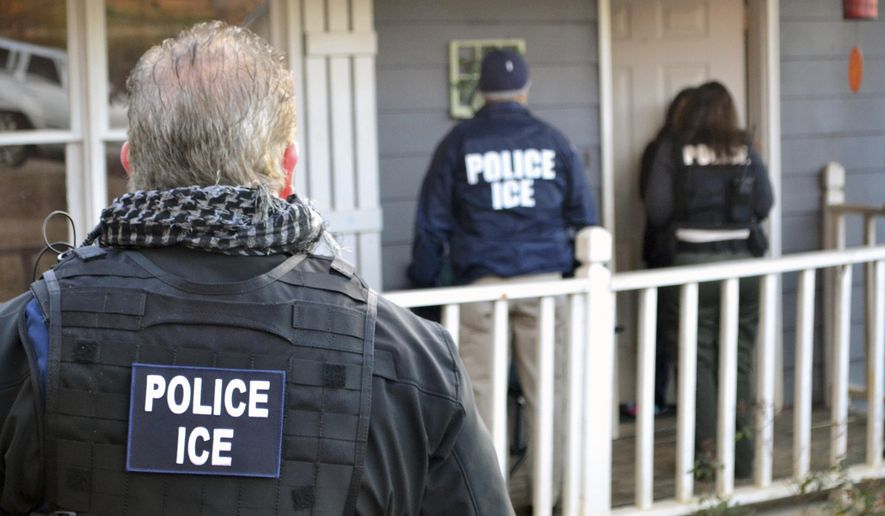Immigration arrests surged 38 percent during the first 100 days of President Trump’s tenure, authorities said Wednesday, adding that agents have been freed from the tight restrictions of the Obama era and are now able to target a far broader universe of illegal immigrants for deportation.
Criminals still dominate the docket, accounting for nearly 30,500 of the immigrants arrested from Jan. 22 to April 29 — up nearly 20 percent compared with a year before. The number of noncriminals surged nearly 60 percent but still accounted for only about 10,800 of the arrests.
Perhaps most striking is the surge in at-large arrests in communities. Those have risen by 50 percent compared with a year earlier, according to U.S. Immigration and Customs Enforcement, the agency responsible for policing the interior of the country.
Thomas Homan, acting director of ICE, said his agents and officers are no longer under the Obama administration’s restrictions that put most illegal immigrants off-limits for deportations. That means they are free to enforce all the laws — though they still put a priority on targeting criminals.
“We are a law enforcement agency, and that’s what we’re going to do — we’re going to enforce the laws on the books,” he said. “Even though the executive orders have expanded the aperture of who we’re arresting, if you look at the numbers, the men and women of ICE are still prioritizing those cases in a way that makes sense.”
Immigrant rights groups, though, said scooping up illegal immigrants without serious criminal records is a mistake. They said some of the criminal offenses are too minor to deserve deportation.
“Driving without a license is used as a pretext for deportation. Re-entering the U.S. to be with family is treated as a major crime. Using a fake document to get a job is called ’criminal,’” said Frank Sharry, executive director of America’s Voice. “We’re not talking about dangers to the public; we’re talking about people trying to work or rejoin their families.”
In a call to brief reporters on the numbers, Mr. Homan was confronted by one reporter who wondered why his agents were targeting immigrants who entered the country illegally. The reporter said that was only a civil offense, not a crime.
Mr. Homan corrected her by pointing to Chapter 8, section 1325 of the U.S. Code.
“That is a criminal act,” he said.
Mr. Homan said his agents are giving those they arrest full due process, including appropriate hearings in immigration courts. But if a judge orders a deportation, he said, then his agents are charged with enforcing that order.
“This country spent billions of dollars a year on border control, making sure these folks get due process. When a federal judge makes a decision, issues an order, that order needs to mean something,” the acting chief said.
The Trump administration said the rate of criminals among its interior arrests is about 75 percent. That compares with a 92 percent criminal rate recorded by the Obama administration last year for immigrants caught and deported from the interior.
Although the number of arrests is up so far under Mr. Trump, deportations are down 12 percent, Mr. Homan said.
He said there are several reasons for the drop, including a backlog at the Justice Department in processing the cases and the increase in the number of criminals, who take longer to deport.
Another factor, he said, is that the rate of illegal immigration is down dramatically on the border, which has always been a large and relatively speedy part of ICE’s deportation workload. Fewer people crossing illegally means fewer people who can be deported quickly.
Mr. Trump campaigned last year on stepping up security along the border and deportations from the interior of the country, saying the problem wasn’t capabilities but rather a lack of political willpower in Washington.
President Obama had drawn up policies that put more than 9 million of the estimated 11 million illegal immigrants in the U.S. out of any real danger of deportation.
Days into his term, Mr. Trump signed two executive orders to revoke those policies. He said that with the exception of Dreamers approved under Mr. Obama’s 2012 deportation amnesty, agents should feel free to arrest anyone susceptible to deportation.
Analysts say the drop in illegal crossings across the U.S.-Mexico border is early fruit from that policy.
But immigration groups have accused Mr. Trump of igniting a wave of fear within their communities, and they have encouraged immigrants to exercise their rights and to resist deportation efforts.
Mr. Homan said that has resulted in a spike in noncompliance. He said there has been a 150 percent surge in targets resisting arrest when his agents encounter them.
“I’ve been doing this for 33 years. One thing that really amazes me is the vilification of ICE’s law enforcement officers,” he said.
• Stephen Dinan can be reached at sdinan@washingtontimes.com.




Please read our comment policy before commenting.